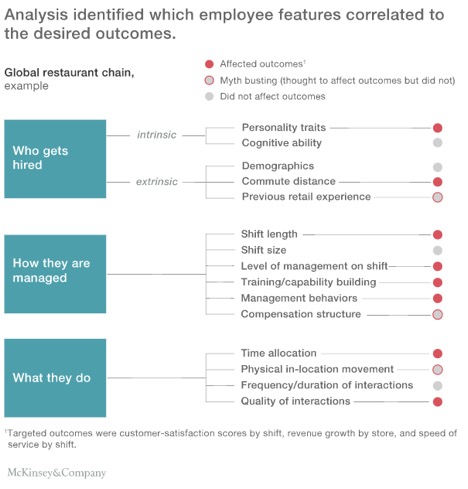
With every company of every size laser-focused on digital transformation, HR is playing a larger role in that process that ever before. There’s an HR pivot happening, and it’s an exciting one. HR teams can no longer simply be the order takers or administrators within an organization, managing the new hire processes and stewarding staff vacation days. Instead, it’s time for a shift to strategic HR—a data-driven approach that not only spearheads digital transformation, but also focuses on inspiring the best performance and utmost productivity—all the while keeping employees motivated and engaged. If that sounds like a tall order, that’s because it is. [Want more on this? Read: How Strategic HR Drives Digital Transformation]
Bottom line: HR’s role within the organization today is completely different than it used to be. Let’s examine the key roles HR pros need to be able to fill today in order to drive business performance—and the available tech that can help.
Five Key New Roles for HR Pros to Drive Business Performance
Just as silos have to go in order to achieve successful digital transformation in other parts of the organization, so must they go in HR. [For more on that topic read, Removing the Silos in the C-Suite, by my partner, Daniel Newman] To accomplish that, HR professionals need to look beyond paperwork, policies, and procedures and don a new set of hats and embrace a completely new skillset. Let’s take a look at what those are:
- Strategic Partner. In best-in-class companies of all sizes, the HR team is no longer viewed as an order taker within the organization—it must be a strategic partner, fully involved in business growth and profitability initiatives. If your HR team doesn’t yet have a seat at the management table when it comes to conversations about growth and business strategy, it needs to. HR is not a backseat role. Rather, it is the people and culture center of a company, and HR leaders should be prepared to discuss the concepts behind and business cases for imperatives like standardizing HR practices, adopting automation that speeds processes and decreases costs, leveraging tech to both find and keep new talent, and devoting proper resources to employee development. If the senior leaders in your organization aren’t there yet in terms of recognizing the vital role the HR team plays in overall business success, it’s your job to make a case for it and convince them.
- Employee Manager and Advocate. It’s no secret that HR plays a gigantic role as it relates to building and fostering the culture of an organization, but there’s more to it than that. HR must also both manage and advocate for employees, and work to create an environment that encourages continuous learning and fosters engagement. Recent data shows many HR pros are already on board this train. One survey found 83 percent of HR leaders recognize employee experience is directly tied to company success and are committed to improving training, physical work spaces, and how they reward top performers. Again, making sure senior leaders within the organization are equally committed to culture and employee experience is the responsibility of the HR team and senior execs.
- Change Agent, Change Driver. Data from the Harvard Business Review found 80 percent of business leaders feel their industries will be disrupted by digital trends by 2020, with 84 percent reporting they feel they’ve already passed the inflection point (or would pass it in three years). What does this have to do with HR? That means you’ve got to embrace being a change agent and a change driver. As technology advances and change permeates industry after industry, the only thing constant is the need for organizations to remain agile if they want to grow and prosper. Agility—with regard to everything from shifting metrics to exploring new platforms to identifying organizational goals and action plans—is mission-critical, and it starts with HR. If you don’t love change, learn to embrace it. And also? Learn to embrace the fact that within the organization, you’ve got to be a change agent. It’s how businesses today, and tomorrow, stay alive, and it’s also how they stay successful. Take it from me—someone who’s every engagement with every client is that of change agent—it’s not easy being the person charged with leading the “change is great” charge. But it’s imperative. Once you get used to it, it’s pretty awesome, too.
- You’re a Marketing Team Member. HR pros need to learn to be marketers in two ways: First, it is the HR team’s responsibility to market new processes, tech, and training methods to current employees in a way that keeps them informed and engaged, especially during periods of change. Second, part of recruiting new high performers is marketing the organization itself. Employees today (especially Millennials) want to know why they should come work for a company beyond the salary and benefits package, considering factors like culture, employee experience, and the mission of the organization. [For more on that, read: Why Millennials Quit: Understanding a New Workforce] Selling a company and the opportunities working for that company (and staying with that company) present in a time where competition for top talent has never been greater requires finesse, and the ability to market. So whether you’re an HR pro looking to recruit top talent or an HR pro focused on motivating and retaining top talent, understanding marketing and integrating a strategy of “the marketing of HR and the marketing of our company” is critical to your success.
- Like it or not, You’re a Data Scientist. Data is the lifeblood of an organization, and that doesn’t stop with HR—in fact, HR is one area being completely revolutionized by data analytics. Take recruiting, retention, and understanding what traits drive employee performance, for example. A recently-published McKinsey & Company case study followed a restaurant chain along its path to leverage people analytics to better understand what traits led to higher employee performance and, ultimately, a better bottom line.
Here are the cliff notes from that case study: The dining chain had high turnover and felt the customer experience was suffering, so they turned to people analytics to help solve the problem. By using the analytics tools, the company was able to do a deep dive into who was hired, how they were managed, and what they did on a day-to-day basis in the restaurants in terms of interfacing with both coworkers and customers. That information was combined with more than 10,000 data points from its stores in four US markets. It was a huge undertaking, but the goal was simple: Find out which variables were tied to the success of the restaurant. After running the numbers and testing multiple hypotheses, the organization could identify which employee features led to the best business outcomes, where management could improve, and how to best keep star team members engaged. Some of the results were surprising, even to leaders who had been in the industry for some time (see Figure 1).
McKinsey reports that, after four months of implementing new processes based on its people analytics inquiry, the experiment has been a success. Speed of service increased by 30 seconds, customer satisfaction increased by over 100 percent, sales increased by 5 percent, and attrition went down.

Figure 1. Source: McKinsey&Company; Using People Analytics to Drive Business Performance: A Case Study
What’s Next?
Today’s HR pros aren’t your grandma’s HR department—they are an integral part of any organization’s operations and present, in large measure, a key driver of overall business success. They aren’t admins, they are the people-people. And people, and culture, is what make, or break, an organization. If you’re in HR, you likely already know this. If you’re in senior management, you need to understand this and take it to heart. HR pros must be strategic partners, employee advocates, managers, teachers, champions, brand stewards, and creators of amazing culture. Today’s HR pros are key drivers of organizational change, they are master marketers, and they are (or will learn to be) data scientists. It’s a lot, isn’t it? Just as everything about marketing has changed in the last ten years or so, everything about human resources has changed as well. It’s exciting, to be sure and it can also be a little overwhelming. If you’re in HR, you know that. What about you and your company? How has your HR department changed as part of the natural evolution of business in the digital age and as your company has embraced digital transformation? What are the biggest challenges you’ve faced, and what do see as the biggest challenges that await? I cover these and more topics on my videocast/podcast series, Future of Work Talk. If you’ve not yet tuned in, I invite you to do so, as we’ll be featuring some interesting guests covering this topic in the coming episodes
Additional Resources on This Topic:
How Onboarding Technology Can Improve Talent Retention
HR Technology—There’s an App For That
The CEO’s Guide to Competing Through HR
Photo Credit: Northstar IOP Flickr via Compfight cc
This article was first published on FOW Media.
Shelly Kramer is a Principal Analyst and Founding Partner at Futurum Research. A serial entrepreneur with a technology centric focus, she has worked alongside some of the world’s largest brands to embrace disruption and spur innovation, understand and address the realities of the connected customer, and help navigate the process of digital transformation. She brings 20 years' experience as a brand strategist to her work at Futurum, and has deep experience helping global companies with marketing challenges, GTM strategies, messaging development, and driving strategy and digital transformation for B2B brands across multiple verticals. Shelly's coverage areas include Collaboration/CX/SaaS, platforms, ESG, and Cybersecurity, as well as topics and trends related to the Future of Work, the transformation of the workplace and how people and technology are driving that transformation. A transplanted New Yorker, she has learned to love life in the Midwest, and has firsthand experience that some of the most innovative minds and most successful companies in the world also happen to live in “flyover country.”

